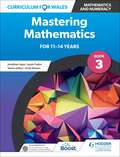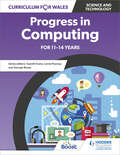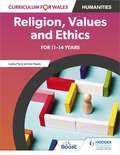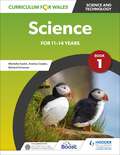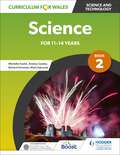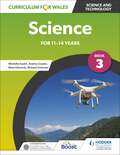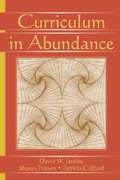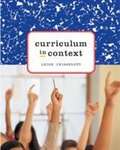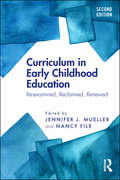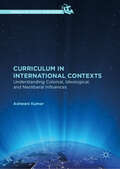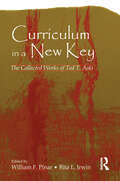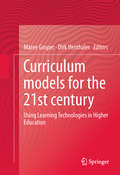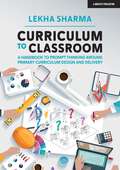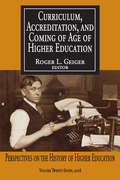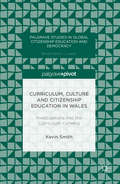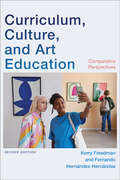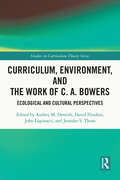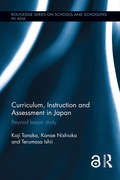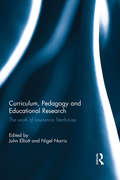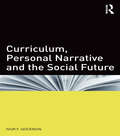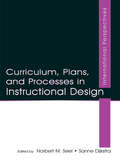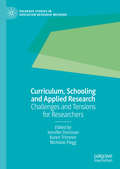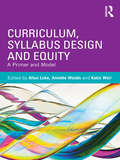- Table View
- List View
Curriculum for Wales: Mastering Mathematics for 11-14 years: Book 3
by Jonathan Agar Laszlo FedorCreate confident and capable mathematicians with accessible explanations and engaging activities.This book gradually builds on prior knowledge to deepen understanding through clear explanations, worked examples and hundreds of differentiated questions, as well as a range of activities that you can choose from to build your lessons and teaching plans. Designed to be used flexibly, this scheme covers the four 'what matters' statements and follows the five principles of progression from the Curriculum for Wales.- Develop pupils' conceptual understanding and communication with symbols throughout using plenty of worked examples and banded questions that get progressively more difficult- Target fluency, logical reasoning and strategic competence by using the markers included in each exercise question- Improve outcomes by selecting from banded questions most suited to enable progression- Ease the transition between progression steps with skill-checker activities at the start of each topic and review questions after each chapter - Link topics to other areas of learning, such as Science and Technology, with cross-curricular activities and discussion points- Improve pupils' understanding of maths in finance with a dedicated chapter and financial contexts highlighted throughout
Curriculum for Wales: Progress in Computing for 11-14 years
by Gareth Evans George Rouse Lorne PearceyConfidently deliver Computing for the new Curriculum for Wales and develop students' ICT skills with the interactive, accessible, and flexible Progress in Computing: Boost eBook.Reboot your Computing classroom with this all-in-one textbook, informed by the new curriculum progression steps, that will inspire you to deliver creative Computing lessons with confidence.Boost knowledge and skills in bite-sized chunks: every double-page spread contains a lesson's worth of targeted content and activitiesChallenge students to think creatively about what they are learning and how it can be applied in the real worldEmpower and encourage students to think take charge of their own progression, with regular knowledge check-ins and activitiesPrepare for the new curriculum with informed coverage of the Computing What Matters statement: 'Computation is the foundation for our digital world'
Curriculum for Wales: Progress in Computing for 11-14 years
by Gareth Evans George Rouse Lorne PearceyConfidently deliver Computing for the new Curriculum for Wales and develop students' ICT skills with the interactive, accessible, and flexible Progress in Computing: Boost eBook.Reboot your Computing classroom with this all-in-one textbook, informed by the new curriculum progression steps, that will inspire you to deliver creative Computing lessons with confidence.Boost knowledge and skills in bite-sized chunks: every double-page spread contains a lesson's worth of targeted content and activitiesChallenge students to think creatively about what they are learning and how it can be applied in the real worldEmpower and encourage students to think take charge of their own progression, with regular knowledge check-ins and activitiesPrepare for the new curriculum with informed coverage of the Computing What Matters statement: 'Computation is the foundation for our digital world'
Curriculum for Wales: Religion, Values and Ethics
by Jan Hayes Lesley ParryConfidently deliver Religion, Values and Ethics and encourage students to understand and appreciate diverse worldviews, both in Wales and the wider world.This book supports the new Curriculum for Wales for 11-14 years, ensuring that students continually develop their knowledge and skills as they become informed, self-aware and responsible citizens.- Easily design your own curriculum: pick-and-choose from topics that cover the major world faiths and non-religious belief groups, as well as the values and ethical content outlined in the Humanities AoLE- Understand religious and non-religious worldviews and their historical impact: examine the influence of institutional and personal religious and non-religious worldviews on Wales and the wider world throughout history- Bring the content to life in your classroom: explore the beliefs and practices of people living today in Wales and the wider world through real-life accounts and case studies- Encourage critical thinking: each lesson tackles a 'big question' for students to consider, as well as activities designed to allow them to formulate and express their own perspectives and a range of sources to engage them with ethical and moral issues- Develop students' sense of self and their understanding of societal challenges: explore key concepts in the context of different religious and ethical worldviews, including cynefin, identity, relationships, community, equality, sustainability, freedom, good and evil, and more
Curriculum for Wales: Science for 11-14 years: Pupil Book 1
by Andrea Coates David Johnston Richard Grimmer Michelle Austin James Lewis Dr Mark Matthews Dr Simon BroadleyInspire a new generation of capable and curious scientists.This book will help build pupils' understanding through clear explanations, practicals and skills-based activities, ensuring that they're ready for the next step in their learning and promoting a sense of cynefin through examples and contexts from all around Wales.- Improve working scientifically skills and prepare students for future lab work with practical skills and suggested activities highlighted throughout- Guide pupils through the trickier maths and literacy skills with key term definitions and worked examples with step-by-step solutions- Support a holistic approach with links between the 'what matters' statements in the Science and Technology Area of Learning and Experience (AoLE)- Boost progress using summaries to recap prior knowledge, alongside 'Check your understanding' questions to embed understanding- Develop pupils' curiosity and interest in science with historical context and examples, including many from across Wales
Curriculum for Wales: Science for 11-14 years: Pupil Book 2
by Andrea Coates Richard Grimmer Michelle Austin Mark EdwardsInspire a new generation of capable and curious scientists.This book will help build pupils' understanding through clear explanations, practicals and skills-based activities, ensuring that they're ready for the next step in their learning and promoting a sense of cynefin through examples and contexts from all around Wales.- Improve working scientifically skills and prepare students for future lab work with practical skills and suggested activities highlighted throughout- Guide pupils through the trickier maths and literacy skills with key term definitions and worked examples with step-by-step solutions- Support a holistic approach with links between the 'what matters' statements in the Science and Technology Area of Learning and Experience (AoLE)- Boost progress using summaries to recap prior knowledge, alongside 'Check your understanding' questions to embed understanding- Develop pupils' curiosity and interest in science with historical context and examples, including many from across Wales
Curriculum for Wales: Science for 11-14 years: Pupil Book 3
by Andrea Coates Richard Grimmer Michelle Austin Mark EdwardsInspire a new generation of capable and curious scientists.This book will help build pupils' understanding through clear explanations, practicals and skills-based activities, ensuring that they're ready for the next step in their learning and promoting a sense of cynefin through examples and contexts from all around Wales.- Improve working scientifically skills and prepare students for future lab work with practical skills and suggested activities highlighted throughout- Guide pupils through the trickier maths and literacy skills with key term definitions and worked examples with step-by-step solutions- Support a holistic approach with links between the 'what matters' statements in the Science and Technology Area of Learning and Experience (AoLE)- Boost progress using summaries to recap prior knowledge, alongside 'Check your understanding' questions to embed understanding- Develop pupils' curiosity and interest in science with historical context and examples, including many from across Wales
Curriculum in Abundance
by David W. Jardine Patricia Clifford Sharon FriesenIn this text Jardine, Clifford, and Friesen set forth their concept of curriculum as abundance and illustrate its pedagogical applications through specific examples of classroom practices, the work of specific children, and specific dilemmas, images, and curricular practices that arise in concrete classroom events. The detailed classroom examples and careful philosophical explorations illustrate the difference it makes in educational theory and classroom practice to think of the curriculum topics entrusted to teachers and students in schools as abundant. The central idea is that viewing what is available to teachers and students in classrooms as abundant, rather than scarce, makes available the unseen histories, language, images, and ideas in everyday classroom life–makes it possible to break open the flat, literal “ordinariness” of classroom events, makes their complex and contested meanings visible, understandable, and pedagogically useful. Understanding the disciplines entrusted to schools (such as mathematics, writing, reading) as living inheritances, not as inert, finished, static, manipulable objects, means that the work of the classroom requires getting in on the real, living conversations that constitute these disciplines as they actually function in the classroom. This view of curriculum as abundance has a profound effect on classroom practice. Curriculum in Abundance addresses curriculum and teaching topics such as mathematics, science, environmental education, social studies, language arts, and the arts curriculum; issues that arise from inviting student-teachers and practicing teachers into the idea of curriculum of abundance; the issue of information and communications technologies in the classroom; and the philosophical underpinnings of constructivism and the dilemmas it poses to thinking about curriculum in abundance. All of the chapters provide images of how to conduct interpretive research in the classroom. This critically important text for undergraduate and master’s-level courses on curriculum methods, curriculum theory, teacher research, and philosophy of education speaks eloquently to students, teachers, teacher educators, and researchers across the field of education.
Curriculum in Context: Designing Curriculum and Instruction for Teaching and Learning in Context
by Leigh ChiarelottEasily design appropriate curricula with CURRICULUM IN CONTEXT! This guidebook for teachers and curricula designers focuses on designing curriculum and instruction in the context of contextual teaching and learning, a system that enables students to find meaning by connecting the content of the lesson with the context of their lives. With a practical focus and numerous examples of designs created by actual teachers, this education text provides you with the concepts and skills you need to make appropriate curricular and instructional decisions for your own school and classroom.
Curriculum in Early Childhood Education: Re-examined, Reclaimed, Renewed
by Jennifer J. Mueller Nancy FileCurriculum in Early Childhood Education: Re-examined, Reclaimed, Renewed critically and thoroughly examines key questions, aims, and approaches in early childhood curricula. Designed to provide a theoretical and philosophical foundation for examining teaching and learning in the early years, this fully updated and timely second edition provokes discussion and analysis among all readers. What influences operate (both historically and currently) to impact what happens in young children's classrooms? Whose perspectives are dominant and whose are ignored? What values are explicit and implicit? Each chapter gives readers a starting point for re-examining key topics, encourages a rich exchange of ideas in the university classroom, and provides a valuable resource for professionals. This second edition has been fully revised to reflect the current complexities and tensions inherent in curricular decision-making and features attention to policy, standardization, play, and diversity, providing readers with historical context, current theories, and new perspectives for the field. Curriculum in Early Childhood Education is essential reading for those seeking to examine curriculum in early childhood and develop a stronger understanding of how theories and philosophies intersect with the issues that accompany the creation and implementation of learning experiences.
Curriculum in International Contexts: Understanding Colonial, Ideological, And Neoliberal Influences (Curriculum Studies Worldwide)
by Ashwani KumarThis book is an exposition of how political, cultural, historical, and economic structures and processes shape the nature and character of curriculum landscapes globally. By developing theoretical connections and providing contextual background, Kumar explores how colonialism and imperialism, state-led ideological control, and the wave of neoliberalism and capitalism insidiously impact the process of curriculum development in different parts of the world. Kumar also underscores how intellectual movements such as Marxism and postmodernism have shaped curriculum theory in varied political and economic settings. By emphasizing the connections between and among diverse cultural and political conceptualizations of curriculum, this volume contributes to the internationalization of curriculum studies discourses.
Curriculum in a New Key: The Collected Works of Ted T. Aoki (Studies in Curriculum Theory Series)
by Ted T. AokiTed T. Aoki, the most prominent curriculum scholar of his generation in Canada, has influenced numerous scholars around the world. Curriculum in a New Key brings together his work, over a 30-year span, gathered here under the themes of reconceptualizing curriculum; language, culture, and curriculum; and narrative. Aoki's oeuvre is utterly unique--a complex interdisciplinary configuration of phenomenology, post-structuralism, and multiculturalism that is both theoretically and pedagogically sophisticated and speaks directly to teachers, practicing and prospective. Curriculum in a New Key: The Collected Works of Ted T. Aoki is an invaluable resource for graduate students, professors, and researchers in curriculum studies, and for students, faculty, and scholars of education generally.
Curriculum models for the 21st century: Using Learning Technologies in Higher Education
by Dirk Ifenthaler Maree GosperChanging student profiles and the increasing availability of mainstream and specialized learning technologies are stretching the traditional face-to-face models of teaching and learning in higher education. Institutions, too, are facing far-reaching systemic changes which are placing strains on existing resources and physical infrastructure and calling into question traditional ways of teaching through lectures and tutorials. And, with an ever-increasing scrutiny on teaching and teachers' accountability for positive educational outcomes, the call for closer attention to learning, teaching and, most especially, to the design and delivery of the curriculum is given increasing relevance and importance. Research provides strong evidence of the potential for technologies to facilitate not only cognition and learning but also to become integral components in the redesign of current curriculum models. Some Universities and individual academics have moved along this pathway, developing new and innovative curriculum, blending pedagogies and technologies to suit their circumstances. Yet, there are others, unsure of the possibilities, the opportunities and constraints in these changing times. Curriculum Models for the 21st Century gives insights into how teaching and learning can be done differently. The focus is on a whole of curriculum approach, looking at theoretical models and examples of practice which capitalize on the potential of technologies to deliver variations and alternatives to the more traditional lecture-based model of University teaching.
Curriculum to Classroom: A Handbook to Prompt Thinking Around Primary Curriculum Design and Delivery
by Lekha SharmaCurriculum to Classroom is the ideal book for senior leaders and curriculum leads who are in the process of establishing, refining and reviewing their school curriculum. It provides an overview of the curriculum design and delivery process in the Primary phase in its entirety. It also provides research-based evidence, practical examples and short/medium and long term solutions for your school in light of the 2014 National Curriculum as well as expert opinions from a number of renowned educators on different elements of the curriculum including: creating a powerful and ambitious vision for your school's curriculum intent; how to promote character development; how best to support and empower subject leads; and the fundamental building blocks in terms of implementation of the curriculum. This book will enable you to consider the many facets of curriculum design and support strategic decision making so your curriculum is meeting and exceeding the expectations of the National Curriculum as well as being unique and bespoke to your school community. An easy-to-read handbook to prompt thinking and reflections on your school's curriculum and provide practical tools and strategies to take it forward.
Curriculum to Classroom: A Handbook to Prompt Thinking Around Primary Curriculum Design and Delivery
by Lekha SharmaCurriculum to Classroom is the ideal book for senior leaders and curriculum leads who are in the process of establishing, refining and reviewing their school curriculum. It provides an overview of the curriculum design and delivery process in the Primary phase in its entirety. It also provides research-based evidence, practical examples and short/medium and long term solutions for your school in light of the 2014 National Curriculum as well as expert opinions from a number of renowned educators on different elements of the curriculum including: creating a powerful and ambitious vision for your school's curriculum intent; how to promote character development; how best to support and empower subject leads; and the fundamental building blocks in terms of implementation of the curriculum. This book will enable you to consider the many facets of curriculum design and support strategic decision making so your curriculum is meeting and exceeding the expectations of the National Curriculum as well as being unique and bespoke to your school community. An easy-to-read handbook to prompt thinking and reflections on your school's curriculum and provide practical tools and strategies to take it forward.
Curriculum, Accreditation and Coming of Age of Higher Education: Perspectives on the History of Higher Education (Perspectives On The History Of Higher Education Ser.)
by Roger L. GeigerThis latest volume in Roger Geiger's distinguished series on the history of higher education begins with a rare glimpse into the minds of mid-nineteenth century collegians. Timothy J. Williams mines the diaries of students at the University of North Carolina to unearth a not unexpected preoccupation with sex, but also a complex psychological context for those feelings. Marc A. VanOverbeke continues the topic in an essay shedding new light on a fundamental change ushering in the university era: the transition from high schools to college.The secularization of the curriculum is a fundamental feature of the emergence of the modern university. Katherine V. Sedgwick explores a distinctive manifestation by questioning why the curriculum of Bryn Mawr College did not refl ect the religious intentions of its Quaker founder and trustees. Secularization is examined more broadly by W. Bruce Leslie, who shows how denominational faith ceded its ascendancy to "Pan-Protestantism."Where does the record of contemporary events end and the study of history begin? A new collection of documents from World War II to the present invites Roger Geiger's refl ection on this question, as well as consideration of the most signifi cant trends of the postwar era. Educators chafi ng under current attacks on higher education may take solace or dismay from the essay "Shaping a Century of Criticism" in which Katherine Reynolds Chaddock and James M. Wallace explore H. L. Mencken's writings, which address enduring issues and debates on the meaning and means of American higher education.
Curriculum, Culture and Citizenship Education in Wales: Investigations into the Curriculum Cymreig (Palgrave Studies in Global Citizenship Education and Democracy)
by Kevin SmithThis book explores how culture and citizenship are theorised, promoted and learned throughout schools in Wales. Following a brief history of Welsh education and a discussion of how contemporary cultural identity is theorised through citizenship education curricula, it illustrates how archaic approaches to understanding cultural identity continue to undermine the development of culturally relevant curriculum in Wales. Smith also analyses how young people discuss their orientations to Welshness, how teachers engage with the requirements of the Curriculum Cymreig and how these reactions develop within educational settings. Ending with a recommendation for a more sophisticated framework for conceptualising identity and a critical approach for discussing citizenship and cultural identity in schools in Wales, this book highlights how the critical pedagogy can progress further.
Curriculum, Culture, and Art Education, Second Edition: Comparative Perspectives
by Kerry Freedman; Fernando Hernández-HernándezA general broadening of content and methods, a renewed emphasis on student interests, and diverse critical perspectives can currently be seen internationally in art curricula. This book explores ways that visual culture in education is helping to move art curricula off their historical foundations and open the field to new ways of teaching, learning, and prefiguring worlds. It highlights critical histories and contemporary stories, showing how cultural milieu influences and is influenced by the various practices that make up the professional field inside and outside of institutional borders. This book shows students how contemporary art educators are responding, revising, and re-creating the field.
Curriculum, Environment, and the Work of C. A. Bowers: Ecological and Cultural Perspectives (Studies in Curriculum Theory Series)
by John Lupinacci Audrey M. Dentith David Flinders Jennifer S. ThomThis edited volume extends ecological approaches to curriculum theory by recognizing and building on the contributions of the late Chet A. Bowers to curriculum and ecological studies globally. Chapters provide in-depth explanation of Bowers’ central contributions to the field, including his identification of the linguistic roots of ecological degradation; the need for school curricula to support sustainability; and the principles of cultural commons, eco-justice, and ecological intelligence. Building on these ideas and emphasizing the links between curriculum studies, social justice, and environmental education, the text illustrates how Bowers’ ideas must now inform future approaches to schooling, teacher education, research, and Indigenous communities to guard against the global ecological crises we now face. This text will benefit researchers, academics, and educators with an interest in curriculum studies, sustainability education, and environmental studies in particular. Those interested in the sociology of education, educational change, and school reform will also benefit from the book.
Curriculum, Instruction and Assessment in Japan: Beyond lesson study (Routledge Series on Schools and Schooling in Asia)
by Koji Tanaka Kanae Nishioka Terumasa IshiiThis book provides a comprehensive overview of the history and current status of policy, research and practices of curriculum, classroom instruction and assessment in Japan. It outlines the mechanism of curriculum organization and the history of the National Courses of Study, and assesses the theories of academic ability model. It also discusses in detail the history of "Lesson Study" – a characteristic teaching practice in Japan which utilizes groups, and reviews the history of educational assessment in Japan. Case studies on the practice of portfolio assessment in the Period for Integrated Study, as well as the practice of performance tasks in subject-based education are illustrated to show various examples of teaching practices.Curriculum, Instruction and Assessment in Japan explores: • Child-centered Curriculum and Discipline-Centered Curriculum • Theories based on Models of Academic Achievement and Competency • Various Methods for Organizing Creative Whole-Class Teaching • Performance Assessment in Subject Teaching A good guideline for those who would like to use the idea of "Lesson Study" in order to improve their own teaching and management practices and a reference to all working in educational improvement, this book will be of interest to educators and policymakers concerned with curriculum practices or those with an interest in the Japanese education system.
Curriculum, Pedagogy and Educational Research: The Work of Lawrence Stenhouse
by John Elliott Nigel NorrisLawrence Stenhouse was one of the most distinguished, original and influential educationalists of his generation. His theories about curriculum, curriculum development, pedagogy, teacher research, and research as a basis for teaching remain compelling and fresh and continue to be a counterpoint to instrumental and technocratic thinking in education. In this book, renowned educationalists describe Stenhouse’s contribution to education, explore the contemporary relevance of his thinking and bring his work and legacy to the attention of a wide range of students, teachers, teacher educators and others involved in education. Stenhouse saw the primary aim of education as the development of individuality through a creative and critical engagement with culture. He was an early advocate of inclusive education and was committed to making available to all pupils an education that was challenging and empowering. For Stenhouse many of the problems of education stemmed not so much from its content as from the terms and conditions under which students were required to access it. Consequently he pioneered an approach to curriculum reform that stressed the quality of the educational process and the values that defined it, as opposed to ‘rational curriculum planning’, which stressed the pre-specification of measureable learning outcomes. Stenhouse devised the curriculum reform movement’s most ambitious strategy, ‘the process model’, and was its principal theorist. His idea of ‘the teacher as researcher’ lay at the heart of this strategy as the means by which the values that define a worthwhile educational process could be progressively realized by teachers in concrete forms of action within their classrooms and schools. What marked out Stenhouse’s unique contribution to the field of curriculum was his distinctive conceptualisation of the relationship between the teacher (authority), the learner (autonomy) and the subject matter (understanding). Founded on his epistemological scepticism and forged in his encounters with expertly discerning teachers who valued and nurtured the intellectual independence of students, Stenhouse acquired an acute appreciation of the ways in which teaching enhances or inhibits, develops or displaces the potential for autonomous thinking of students. He changed the relationship between curriculum theory, educational research and teachers; placing teachers right at the heart of the curriculum development process and the teacher as researcher at the heart of teacher professionalism.
Curriculum, Personal Narrative and the Social Future
by Ivor F. GoodsonRecent writing on education and social change, and a growing number of new governmental initiatives across Western societies have proceeded in denial or ignorance of the personal missions and biographical trajectories of key public sector personnel. This book stems from an underpinning belief that we have to understand the personal biographical if we are to understand the fate of social and political initiatives. In education a pattern has emerged in many countries around the world. Each new government enshrines targets and tests to ensure that teachers at the frontline delivery are ‘more accountable’. Whilst this often provides evidence of symbolic action to the electorate or professional audiences, the evidence at the level of service delivery is often far less impressive. Targets, tests and tables may win wide support from the public, but there are often negligible or even contradictory effects at the point of delivery, enforced by the ignorance or denial of personal missions and biographical mandates. This book locates most of its analysis and discussion at the point of culture clash between centralised dictates, and individual and collective life missions. Whilst the early part of the book considers a range of issues related to school curriculum, the focus on the biographical and life narrative becomes increasingly important as the analysis proceeds. Curriculum, Personal Narrative and the Social Future will be of key interest to practising teachers, educational researchers and students on teacher training courses, postgraduate courses and doctoral courses.
Curriculum, Plans, and Processes in Instructional Design: International Perspectives
by Norbert M. Seel Sanne DijkstraCurriculum, Plans, and Processes in Instructional Design: International Perspectives presents perspectives on the relationship between curriculum research and instructional design, as well as new developments in the use of information and communication technology. In their introductory chapter, the editors provide an overview of the volume and introduce the discussions found in three sections: *The chapters in Part I (Theoretical Foundations and Innovations) describe and discuss new theoretical and innovative approaches to instructional design that integrate curriculum development with information and communication technologies. *Part II (Curriculum Development, Instructional Design, and Information Technology) focuses on curriculum development and its impact on models of instructional design. *Part III (Information and Communication Technology and Instructional Design) addresses the challenge of advancing information and communication technologies for instructional planning and curriculum development. Prominent researchers and practitioners from instructional design, as well as the learning sciences--from both the U.S. and around the world--have contributed to this volume. This volume is a valuable resource for graduate students, scholars, and researchers in the fields of instructional design and educational technology, as well as for those who wish to develop expertise in training in industrial, military, public and academic organizations.
Curriculum, Schooling and Applied Research: Challenges and Tensions for Researchers (Palgrave Studies in Education Research Methods)
by Jennifer Donovan Karen Trimmer Nicholas FleggThis book explores how teachers can navigate the complex process of managing change within the classroom. The chapters highlight the new challenges that have arisen with the emergence and introduction of educational technology as teachers find themselves having to be responsive to the needs and demands of multiple stakeholders. Traversing a range of conceptual, disciplinary and methodological boundaries, the editors and contributors investigate the tensions that impinge on research-based change and how to integrate directed changes into their education system and classroom. Subsequently, this volume argues that posing these questions leads to increased understanding of the possible long term effects of educational change, and how teachers can know whether their solutions are effective.
Curriculum, Syllabus Design and Equity: A Primer and Model
by Allan Luke Annette Woods Katie WeirCurriculum scholars and teachers working for social justice and equity have been caught up in acrimonious and polarizing political debates over content, ideology, and disciplinary knowledge. At the forefront in cutting through these debates and addressing the practical questions involved, this book is distinctive in looking to the technical form of the curriculum rather than its content for solutions. The editors and contributors, all leading international scholars, advance a unified, principled approach to the design of curriculum and syllabus documents that aims for high quality/high equity educational outcomes and enhances teacher professionalism with appropriate system prescription. Stressing local curriculum development capacity and teacher professional responses to specific community and student contexts, this useful, practical primer introduces and unpacks definitions of curriculum, syllabus, the school subject, and informed professionalism; presents key principles of design; discusses a range of approaches; and offers clear, realistic guidelines for the tasks of writing curriculum documents and designing official syllabi and professional development programs at system and school levels. Providing a foundational structure for syllabus design work, Curriculum, Syllabus Design, and Equity is relevant for teachers, teacher educators, and curriculum policy workers everywhere who are engaged in the real work of curriculum writing and implementation.
